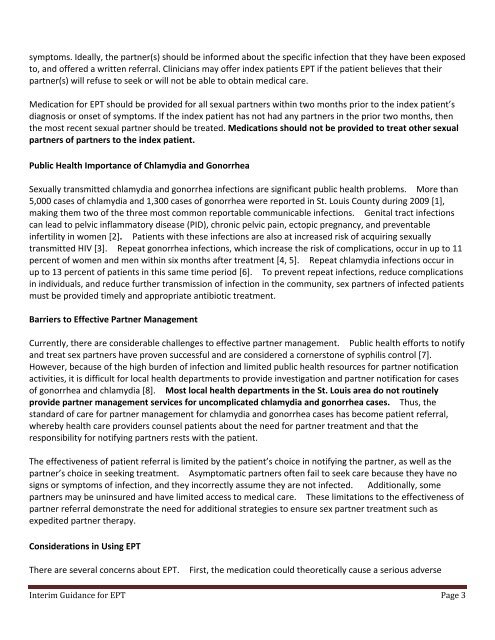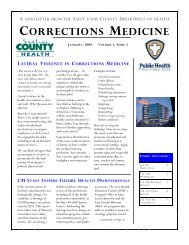Interim Guidelines for Expedited Partner Therapy - St. Louis County
Interim Guidelines for Expedited Partner Therapy - St. Louis County
Interim Guidelines for Expedited Partner Therapy - St. Louis County
You also want an ePaper? Increase the reach of your titles
YUMPU automatically turns print PDFs into web optimized ePapers that Google loves.
symptoms. Ideally, the partner(s) should be in<strong>for</strong>med about the specific infection that they have been exposed<br />
to, and offered a written referral. Clinicians may offer index patients EPT if the patient believes that their<br />
partner(s) will refuse to seek or will not be able to obtain medical care.<br />
Medication <strong>for</strong> EPT should be provided <strong>for</strong> all sexual partners within two months prior to the index patient’s<br />
diagnosis or onset of symptoms. If the index patient has not had any partners in the prior two months, then<br />
the most recent sexual partner should be treated. Medications should not be provided to treat other sexual<br />
partners of partners to the index patient.<br />
Public Health Importance of Chlamydia and Gonorrhea<br />
Sexually transmitted chlamydia and gonorrhea infections are significant public health problems. More than<br />
5,000 cases of chlamydia and 1,300 cases of gonorrhea were reported in <strong>St</strong>. <strong>Louis</strong> <strong>County</strong> during 2009 [1],<br />
making them two of the three most common reportable communicable infections. Genital tract infections<br />
can lead to pelvic inflammatory disease (PID), chronic pelvic pain, ectopic pregnancy, and preventable<br />
infertility in women [2]. Patients with these infections are also at increased risk of acquiring sexually<br />
transmitted HIV [3]. Repeat gonorrhea infections, which increase the risk of complications, occur in up to 11<br />
percent of women and men within six months after treatment [4, 5]. Repeat chlamydia infections occur in<br />
up to 13 percent of patients in this same time period [6]. To prevent repeat infections, reduce complications<br />
in individuals, and reduce further transmission of infection in the community, sex partners of infected patients<br />
must be provided timely and appropriate antibiotic treatment.<br />
Barriers to Effective <strong>Partner</strong> Management<br />
Currently, there are considerable challenges to effective partner management. Public health ef<strong>for</strong>ts to notify<br />
and treat sex partners have proven successful and are considered a cornerstone of syphilis control [7].<br />
However, because of the high burden of infection and limited public health resources <strong>for</strong> partner notification<br />
activities, it is difficult <strong>for</strong> local health departments to provide investigation and partner notification <strong>for</strong> cases<br />
of gonorrhea and chlamydia [8]. Most local health departments in the <strong>St</strong>. <strong>Louis</strong> area do not routinely<br />
provide partner management services <strong>for</strong> uncomplicated chlamydia and gonorrhea cases. Thus, the<br />
standard of care <strong>for</strong> partner management <strong>for</strong> chlamydia and gonorrhea cases has become patient referral,<br />
whereby health care providers counsel patients about the need <strong>for</strong> partner treatment and that the<br />
responsibility <strong>for</strong> notifying partners rests with the patient.<br />
The effectiveness of patient referral is limited by the patient’s choice in notifying the partner, as well as the<br />
partner’s choice in seeking treatment. Asymptomatic partners often fail to seek care because they have no<br />
signs or symptoms of infection, and they incorrectly assume they are not infected. Additionally, some<br />
partners may be uninsured and have limited access to medical care. These limitations to the effectiveness of<br />
partner referral demonstrate the need <strong>for</strong> additional strategies to ensure sex partner treatment such as<br />
expedited partner therapy.<br />
Considerations in Using EPT<br />
There are several concerns about EPT.<br />
First, the medication could theoretically cause a serious adverse<br />
<strong>Interim</strong> Guidance <strong>for</strong> EPT Page 3
















